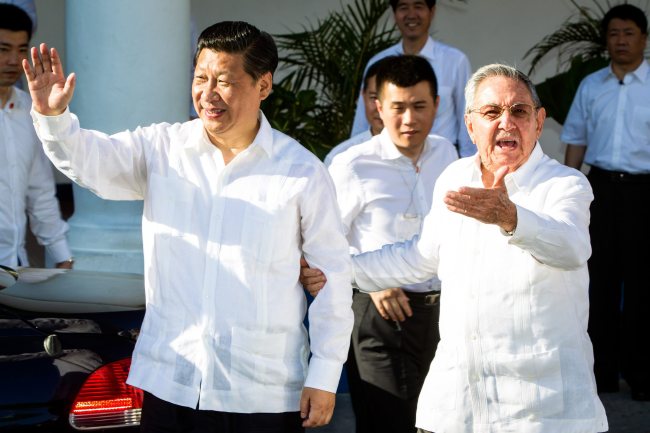HAVANA (AFP) ― Chinese President Xi Jinping wrapped up a nine-day Latin American tour in Cuba on Wednesday, heading home with dozens of deals underlining Beijing’s growing interest ― and influence ― in the region.
Xi kicked off his trip at a summit of the BRICS emerging powers in Brazil, then traveled to Argentina, Venezuela and Cuba ― three countries that have often been among the most outspoken critics of U.S. dominance over the region.
His charm offensive began with the announcement by the BRICS ― Brazil, Russia, India, China and South Africa ― of a new $50 billion development bank and $100 billion reserve fund designed to provide an alternative to the Western-led World Bank and International Monetary Fund.
Latin American leaders had glowing praise for the move, which Xi followed up by proposing a $20 billion infrastructure fund for the region.
 |
Cuban President Raul Castro (right) and his Chinese counterpart Xi Jinping are seen during a visit to Santiago de Cuba, east of Havana, Cuba, where the Chinese leader ended his official visit to the island, Wednesday. (EPA-Yonhap) |
“A new beginning, a new perspective, a new motivation,” he said at the launch of the development bank on July 15.
It earned him a warm welcome in Argentina, whose cash-strapped government, locked out of capital markets since defaulting on its debt in 2001, is fighting off hedge funds in a U.S. court while staring down the threat of another default.
Argentina and China signed more than 20 deals worth several billion dollars during Xi’s visit, in areas from oil to mining to agriculture.
“The arrival of new actors is going to bring our countries new and better opportunities, because it will no longer be possible to have a world where some dominate others. It will be a world of cooperation and that should be the new global model,” said Argentine President Cristina Kirchner.
Xi again had his sights on raw materials and energy in his visit to Venezuela, where he signed some 30 deals with President Nicolas Maduro in the oil, mining and agriculture sectors.
“Venezuela has become one of the top countries for Chinese investment,” said Xi.
China is also Venezuela’s top creditor, and the second-largest market for Venezuelan oil after the United States. It pays for its average 640,000 daily barrels in part by writing down the $17 billion debt Caracas owes it.
Xi announced a “comprehensive strategic partnership” with both Argentina and Venezuela, highlighting China’s eagerness to do business with the two resource-rich countries often given the cold shoulder by U.S. and European investors.
He took the same tack in Cuba, signing more than two dozen deals ranging from a credit line to modernize the port of Santiago de Cuba, to developing golf courses in the Americas’ only communist-ruled nation.
Cuba does not have as much heft on global markets as the other stops on Xi’s itinerary, but its Cold War history is bound up with China’s.
“China is full of confidence about the future development of relations between our country and Cuba, and that we will forever be good friends, comrades and brothers of Cuba,” Xi said.
But analysts said his trip was more about business than ideology.
“China’s political and economic expansion is pragmatic in character. It’s not about ideology or competition with the United States, but a Chinese policy of looking long-term for natural resources in different parts of the world,” said Venezuelan political analyst Carlos Romero.
Latin America in turn “represents a promising market for Chinese consumer goods,” said Carlos Malamud of the Elcano Institute in Caracas.








